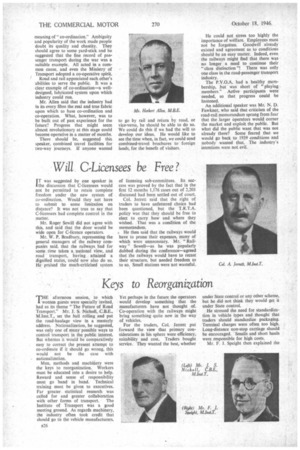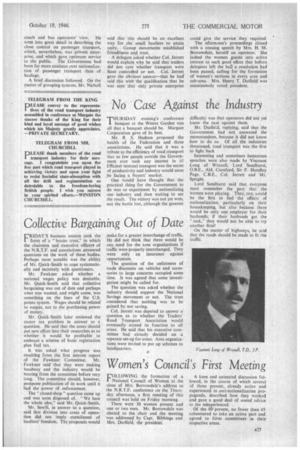Keys to Reorganization
Page 32

Page 33

If you've noticed an error in this article please click here to report it so we can fix it.
'THE afternoon session, to which 1 women guests were specially invited, had as its theme "The Future of Road Transport." Mr. J. S. Nicholl, C.B.E.. Minst.T., set the ball rolling and put the road-haulage view in a masterly address. Nationalization, he suggested, was only one of many possible ways to control transport in the public interest. But whereas it would be comparatively easy to correct the present attempt to co-ordinate if it should go wrong, this would not be the case with nationalization.
Men, methods and machinery were the keys to reorganization. Workers must be educated into a desire to help. Reward and sense of responsibility must go hand in hand. Technical training must be given to executives. Far greater statistical research was called for and greater collaboration with other forms of transport. The Institute of Transport was Is good meeting ground. As regards machinery, the industry often took credit that should go to the vehicle manufacturers. Yet perhaps in the future the operators would develop something that the manufacturers have not thought of. Co-operation with the railways might bring something quite new in the way of vehicles.
For the traders, Col. Jerrett put forward the view that primary considerations in his sphere were efficiency, suitability and cost. Traders bought service. They wanted the best, whether under State control or any other scheme, but he did not think they would get it under State control.
He stressed the need for standardization in vehicle types and thought that traders should standardize packaging. Terminal charges were often too high. Long-distance non-stop carriage should be encouraged. Smalls and short hauls were responsible for high costs.
Mr. F. J. Speight then explained the coach and bus operators' view. He went into great detail in describing the close control on passenger transport, which, nevertheless, was private enterprise, and which gave optimum service 10 the public. The Government had been far more cautious over nationalization of passenger transport than of haulage.
A brief discussion followed. On the matter of grouping systems, Mr. Nichol! said that this should be an excellent way for the small hauliers to attain unity. Group movements established friendliness and trust.
A delegate asked whether Col. Jerrett would explain why he said that traders did not care 'whether transport were State controlled or not. Col. Jerrett gave the Obvious answer—that he had said this with the qualification that he was sure that only private enterprise could give the service they. required.
The afternoon's proceedings closed with a rousing speech by Mrs. H. M. Borrowdale, herself an operator. She lashed the women guests into active interest to such good effect that before delegates left the haff a resolution had been passed, calling for the formation of women's sections in every area and sub-area. Mrs. Henry T. Duffield was unanimously voted president.












































































